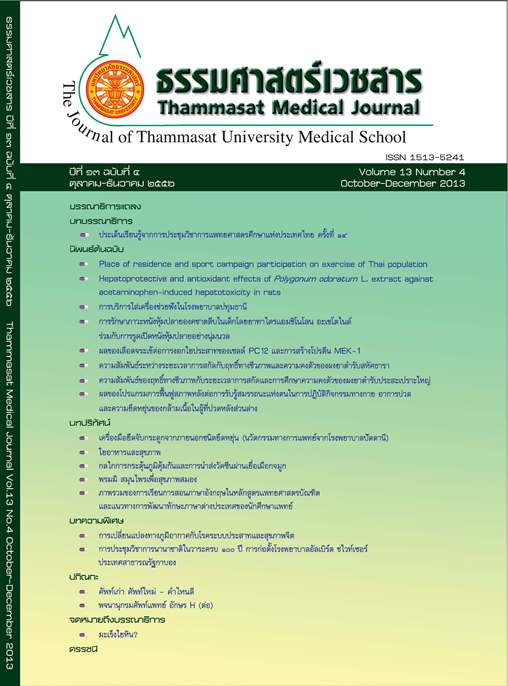Effect of crocodile serum on neurite outgrowth and MEK-1 synthesis in PC12 culture
Keywords:
Crocodile serum, Neuritogenesis, MEK-1 synthesisAbstract
Introduction: Crocodile blood was used as single drug or as combined recipe in traditional medicine asnootropic drug and chronic disease therapy. Insulin-like growth factor-1 (IGF-1), found in crocodile serum,was reported to protect neuronal cell dead when cultured in serum-free medium. The assessments ofneurite outgrowth and mitogen activated protein kinase (MAPK) or MEK-1, producing while cell proliferatedand differentiated, are striking mechanisms in nootropic drugs research. The aim of this study was toverify the effect of crocodile serum on neurite outgrowth and MEK-1 synthesis in PC12 culture.
Method: PC12 was cultured with freeze-dried serum obtained from 10 crocodiles. The percentage of neuriteoutgrowth bearing cell was counted and the amount of MEK-1 was assessed by enzyme immunoassay
Result: The IC50 of crocodile serum was 25.26 mg/ml. Serum at concentration of 4 mg/ml with NGF 2 ng/mlgroup potentiated proliferation and neurite outgrowth (9.04 ± 3.42%) more than the negative controlgroup with NGF 2 ng/ml (3.05 ± 1.32%) but lesser than the positive control group with NGF 50 ng/ml(14.81 ± 3.79%) (p < 0.05). The amount of MEK-1 was also increase in the treatment of 4 mg/mlgroup as 204.83 ± 28.91% and the positive control group as 253.26 ± 34.2% (p < 0.05). The dilutedserum of 2 and 0.4 mg/ml with NGF 2 ng/ml had no effect on neurite outgrowth and MEK-1 synthesis.
Discussion and conclusion: This effect might due to the IGF-1 and other active substances contained in crocodile blood. As theand therapeutic window of the crocodile serum was rather narrow, so for nootropic use, the repeated smalldoses of the serum should be suggested.
Key words: Crocodile serum, Neuritogenesis, MEK-1 synthesis



